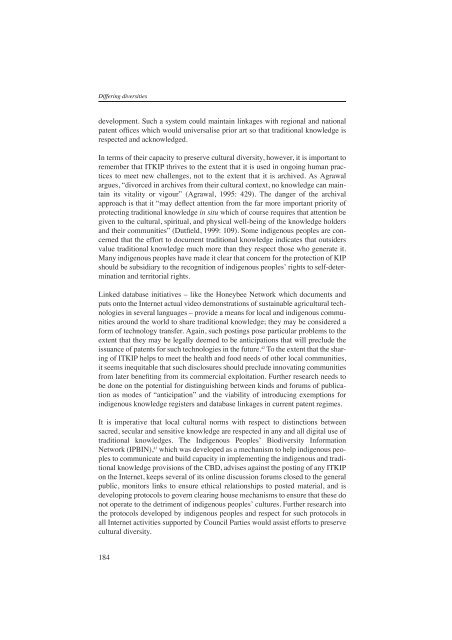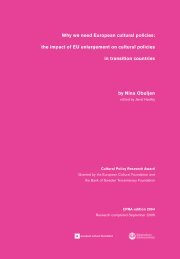Tony Bennett, Differing diversities - Council of Europe
Tony Bennett, Differing diversities - Council of Europe
Tony Bennett, Differing diversities - Council of Europe
You also want an ePaper? Increase the reach of your titles
YUMPU automatically turns print PDFs into web optimized ePapers that Google loves.
<strong>Differing</strong> <strong>diversities</strong>development. Such a system could maintain linkages with regional and nationalpatent <strong>of</strong>fices which would universalise prior art so that traditional knowledge isrespected and acknowledged.In terms <strong>of</strong> their capacity to preserve cultural diversity, however, it is important toremember that ITKIP thrives to the extent that it is used in ongoing human practicesto meet new challenges, not to the extent that it is archived. As Agrawalargues, “divorced in archives from their cultural context, no knowledge can maintainits vitality or vigour” (Agrawal, 1995: 429). The danger <strong>of</strong> the archivalapproach is that it “may deflect attention from the far more important priority <strong>of</strong>protecting traditional knowledge in situ which <strong>of</strong> course requires that attention begiven to the cultural, spiritual, and physical well-being <strong>of</strong> the knowledge holdersand their communities” (Dutfield, 1999: 109). Some indigenous peoples are concernedthat the effort to document traditional knowledge indicates that outsidersvalue traditional knowledge much more than they respect those who generate it.Many indigenous peoples have made it clear that concern for the protection <strong>of</strong> KIPshould be subsidiary to the recognition <strong>of</strong> indigenous peoples’ rights to self-determinationand territorial rights.Linked database initiatives – like the Honeybee Network which documents andputs onto the Internet actual video demonstrations <strong>of</strong> sustainable agricultural technologiesin several languages – provide a means for local and indigenous communitiesaround the world to share traditional knowledge; they may be considered aform <strong>of</strong> technology transfer. Again, such postings pose particular problems to theextent that they may be legally deemed to be anticipations that will preclude theissuance <strong>of</strong> patents for such technologies in the future. 42 To the extent that the sharing<strong>of</strong> ITKIP helps to meet the health and food needs <strong>of</strong> other local communities,it seems inequitable that such disclosures should preclude innovating communitiesfrom later benefiting from its commercial exploitation. Further research needs tobe done on the potential for distinguishing between kinds and forums <strong>of</strong> publicationas modes <strong>of</strong> “anticipation” and the viability <strong>of</strong> introducing exemptions forindigenous knowledge registers and database linkages in current patent regimes.It is imperative that local cultural norms with respect to distinctions betweensacred, secular and sensitive knowledge are respected in any and all digital use <strong>of</strong>traditional knowledges. The Indigenous Peoples’ Biodiversity InformationNetwork (IPBIN), 43 which was developed as a mechanism to help indigenous peoplesto communicate and build capacity in implementing the indigenous and traditionalknowledge provisions <strong>of</strong> the CBD, advises against the posting <strong>of</strong> any ITKIPon the Internet, keeps several <strong>of</strong> its online discussion forums closed to the generalpublic, monitors links to ensure ethical relationships to posted material, and isdeveloping protocols to govern clearing house mechanisms to ensure that these donot operate to the detriment <strong>of</strong> indigenous peoples’ cultures. Further research intothe protocols developed by indigenous peoples and respect for such protocols inall Internet activities supported by <strong>Council</strong> Parties would assist efforts to preservecultural diversity.184














